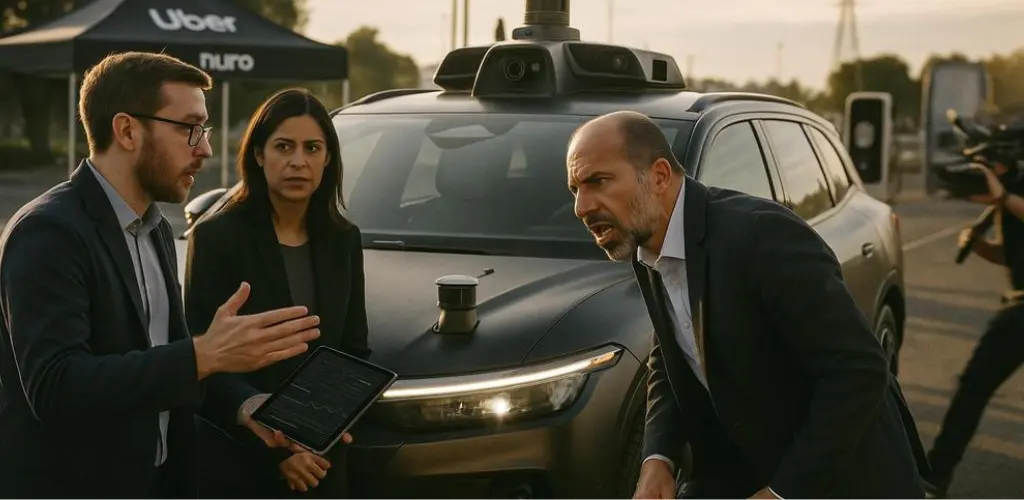In a bold move set to reshape the autonomous mobility landscape, Lucid Motors, Uber Technologies, and AV startup Nuro have joined forces to deploy up to 20,000 autonomous robotaxis over the next six years. The partnership, announced on July 17, 2025, will leverage Lucid’s electric vehicle platforms, Nuro’s AI-powered self-driving technology, and Uber’s global ride-hailing infrastructure to deliver a premium autonomous rideshare experience. In response to the announcement, Lucid’s stock surged more than 40% in pre-market trading, while Uber’s stock also climbed.
A High-Stakes Bet on Electrification and Autonomy
Under the agreement, Uber will integrate Lucid’s upcoming all-electric Gravity SUV—offering an estimated 450 miles of range—into its platform. These vehicles will be powered by Nuro’s Level 4 autonomy system, a technology capable of safely navigating streets without human intervention under specific conditions.
The majority of the 20,000 vehicles will enter service through Uber’s network by 2031. Management models will include vehicles operated directly by Uber, as well as by affiliated fleet companies such as Alto and Avomo.
“Autonomous vehicles have enormous potential to transform our cities for the better,” said Dara Khosrowshahi, Uber’s CEO. “We’re thrilled to partner with Nuro and Lucid on this new robotaxi program, purpose-built just for the Uber platform, to safely bring the magic of autonomous driving to more people across the world.”
Uber Puts Its Money Behind the Wheel
Signaling its level of commitment, Uber is investing $300 million into Lucid and a multi-hundred-million-dollar sum into Nuro. The combined investments reflect a strategic move to secure long-term access to cutting-edge electric and autonomous vehicle technology and to reduce reliance on traditional driver supply.
Lucid’s interim CEO, Marc Winterhoff, described Uber’s investment as “validation” of the company’s architectural platform and its aspiration to pivot into the multi-trillion-dollar autonomous mobility market. “This is the start of our path to extend our innovation and technology leadership,” Winterhoff said.
For Nuro, which has spent a decade developing AI-first autonomous systems—initially for goods delivery—the partnership represents a turning point. “This partnership will demonstrate what’s possible when proven AV technology meets real-world scale,” said Jiajun Zhu, the company’s co-founder and CEO.
Markets Respond as Lucid Looks to Regain Traction
The public markets quickly rewarded news of the alliance. Lucid’s shares jumped more than 40% after languishing at $2.29 just weeks earlier, a figure that had dropped over 25% in the past six months. Meanwhile, Uber’s stock also climbed, buoyed by investor confidence in the long-term revenue potential of autonomous operations.
Adding to the day’s developments, Lucid announced plans to initiate a 1:10 reverse stock split, aimed at elevating its share price and making the stock more attractive to institutional investors. The proposed split, subject to shareholder approval, would consolidate every ten shares into a single share. Though this changes the price, not the value or proportional ownership, it may help the automaker comply with Nasdaq listing requirements and reshape investor sentiment in its favor.
Lucid’s Road to Financial Stability
Despite the market’s optimism, Lucid faces significant financial hurdles. The automaker reported delivery of 3,309 vehicles in the second quarter of 2025, coming in under analyst expectations. As of March, its accumulated deficit had reached $13.3 billion. With ongoing capital needs and rising development costs, this partnership—along with its stock structure proposal—marks an urgent effort to reinforce investor confidence and stabilize the business.
Uber Advances Its Autonomous Agenda
This partnership marks a definitive shift in Uber’s autonomous strategy, distinguishing it from previous exploratory partnerships. The agreement with Lucid and Nuro is Uber’s first binding commitment to purchase a large number of vehicles from a manufacturer. It comes as Uber has expanded its AV partnerships to more than 18 companies globally, including collaborations with Waymo and WeRide. The ride-hailing giant already reaches an annualized 1.5 million autonomous trips, but aims to significantly scale that figure worldwide.
Tesla, Waymo, and the Emerging Autonomous Race
Industry leaders such as Tesla and Waymo have made substantial progress in autonomous vehicle deployment, but the Lucid-Uber-Nuro alliance introduces a new dynamic: a luxury, electric, fully autonomous rideshare option backed by large-scale investment and platform reach. Lucid’s Gravity SUV will go head-to-head with Tesla’s robotaxi ambitions and Waymo’s operational pilots already running in U.S. cities.
By combining a premium EV platform with mature autonomous software and a global distribution engine, this joint venture seeks to accelerate customer adoption while elevating the ride-hailing experience.
Timelines and Milestones
- Early 2025: Uber expands AV testing through partnerships with May Mobility, Momenta, and others.
- July 17, 2025: Lucid, Uber, and Nuro announce the robotaxi partnership.
- July 17, 2025: Lucid files for a 1:10 reverse stock split with intentions to adjust public perception.
Challenges on the Road Ahead
The path to widespread robotaxi deployment is fraught with technical, regulatory, and social hurdles. Despite Nuro’s technological maturity, ensuring safety across diverse urban conditions remains a critical barrier. Regulatory approvals will vary by jurisdiction, and public trust in driverless technology still lags behind its potential.
Financially, Lucid’s success depends not only on Uber’s investment but also on its ability to scale production, reduce costs, and maintain vehicle quality at high volumes. Vehicle reliability, charging infrastructure, and operational efficiency will all influence the long-term viability of this venture.
A New Chapter in Urban Mobility
With this multibillion-dollar alliance, Lucid, Uber, and Nuro are attempting to reframe how cities move. The initiative combines next-generation electric vehicle engineering with advanced autonomy and a vast ride-hailing platform to offer what could become a mainstream, premium robotaxi service.
Whether this partnership ultimately sets a new course for urban transportation or adds pressure to an already saturated AV marketplace will depend largely on execution, public acceptance, and regulatory navigation. But for now, the companies are betting—and investors are agreeing—that this triad could drive the next great leap in urban transit.



